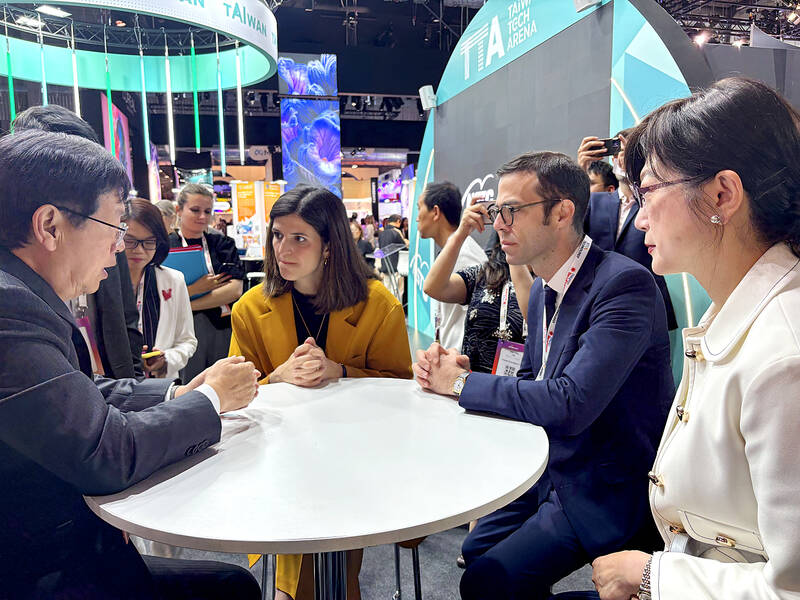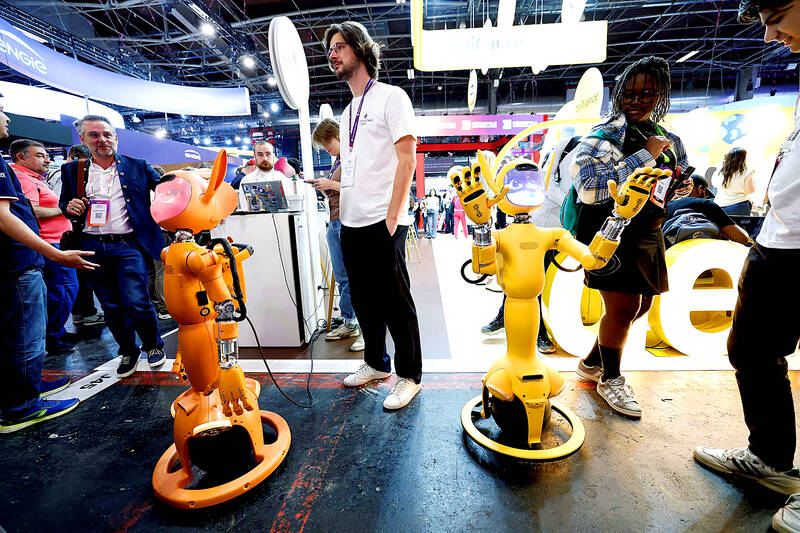Taiwan is showcasing its tech and start-up strengths at this year’s Viva Technology conference, with the Taiwan Pavilion opening its exhibition on Wednesday in Paris.
The Taiwan Pavilion features 29 tech start-ups that can “solve problems in 34 industrial fields,” said Lin Der-sheng (林德生), head of the Taiwanese delegation and a department director at the National Science and Technology Council.
Participants at the Taiwan Pavilion’s opening ceremony on Wednesday afternoon included French Minister Delegate for Artificial Intelligence and Digital Technology Clara Chappaz, French Minister of Higher Education Sylvie Retailleau, Viva Technology Global Partnerships and Public Affairs head Julie Lamande, Hon Hai Precision Industry Co (鴻海精密) chairman Young Liu (劉揚偉) and representatives from the US, Germany, Japan, Switzerland and Brazil.

Photo: CNA
Taiwan provides significant “inspiration” to France and Europe in the tech ecosystem, Lamande said, expressing hope for a collaboration between France and Taiwan in the semiconductor industry.
“Taiwan is clearly leading in the AI [artificial intelligence] field, especially in deep tech and chipmaking,” she said, adding that AI is the focus of this year’s event.
France and Taiwan have a lot of potential for shared momentum and complementarity, as “Taiwan is strong, with experience in business collaboration and technology, while France has advantages in research and higher education talent,” Retailleau said.

Photo: Reuters
Chappaz expressed willingness to deepen collaborations with Hon Hai, after the company announced memorandums of understanding with France’s Thales Group and Radiall SA last month.
Nvidia Corp CEO Jensen Huang (黃仁勳), described by French media as “the new global tech leader from Taiwan in a leather jacket,” delivered a keynote speech at the event. It drew such a large crowd that many were unable to enter the venue.
Pegatron Corp (和碩) also showcased its RA4802-72N2 server rack, built on Nvidia’s Blackwell architecture, at the event, while Asustek Computer Inc (華碩) introduced its latest portfolio of AI infrastructure solutions and announced collaborations with AI firm Nebius Group NV.
Viva Technology, founded in 2016, is one of Europe’s biggest tech trade fairs. More than 13,500 start-ups, 3,500 exhibitors, 3,200 investors and 165,000 participants are expected to attend the four-day event, which ends tomorrow.

South Korea’s equity benchmark yesterday crossed a new milestone just a month after surpassing the once-unthinkable 5,000 mark as surging global memory demand powers the country’s biggest chipmakers. The KOSPI advanced as much as 2.6 percent to a record 6,123, with Samsung Electronics Co and SK Hynix Inc each gaining more than 2 percent. With the benchmark now up 45 percent this year, South Korea’s stock market capitalization has also moved past France’s, following last month’s overtaking of Germany’s. Long overlooked by foreign funds, despite being undervalued, South Korean stocks have now emerged as clear winners in the global market. The so-called “artificial intelligence

‘SEISMIC SHIFT’: The researcher forecast there would be about 1.1 billion mobile shipments this year, down from 1.26 billion the prior year and erasing years of gains The global smartphone market is expected to contract 12.9 percent this year due to the unprecedented memorychip shortage, marking “a crisis like no other,” researcher International Data Corp (IDC) said. The new forecast, a dramatic revision down from earlier estimates, gives the latest accounting of the ongoing memory crunch that is affecting every corner of the electronics industry. The demand for advanced memory to power artificial intelligence (AI) tasks has drained global supply until well into next year and jeopardizes the business model of many smartphone makers. IDC forecast about 1.1 billion mobile shipments this year, down from 1.26 billion the prior

People stand in a Pokemon store in Tokyo on Thursday. One of the world highest-grossing franchises is celebrated its 30th anniversary yesterday.

NEW IDENTITY: Known for its software, India has expanded into hardware, with its semiconductor industry growing from US$38bn in 2023 to US$45bn to US$50bn India on Saturday inaugurated its first semiconductor assembly and test facility, a milestone in the government’s push to reduce dependence on foreign chipmakers and stake a claim in a sector dominated by China. Indian Prime Minister Narendra Modi opened US firm Micron Technology Inc’s semiconductor assembly, test and packaging unit in his home state of Gujarat, hailing the “dawn of a new era” for India’s technology ambitions. “When young Indians look back in the future, they will see this decade as the turning point in our tech future,” Modi told the event, which was broadcast on his YouTube channel. The plant would convert